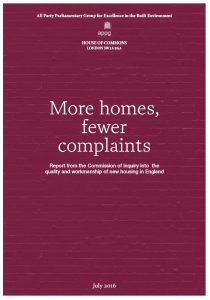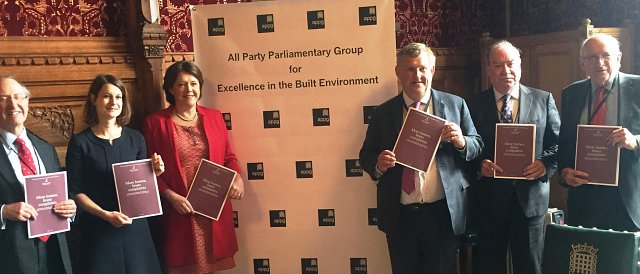 MPs call for the DCLG to set up a New Homes Ombudsman in APPG Inquiry Report published on 13 July 2016.
MPs call for the DCLG to set up a New Homes Ombudsman in APPG Inquiry Report published on 13 July 2016.
At long last seven months after the last evidence session on 14 December 2015, the All Party Parliamentary Group for Excellence in the Built Environment (APPGEBE) has finally published the findings and recommendations in the report following its: “Inquiry Into the Quality of New Build Housing in England”

Lord Best, Helen Hayes MP (Lab), Maria Miller MP (Con), Chair Oliver Colvile MP (Con), Tony Burton, Nick Raynsford
The APPG Inquiry Report strangely titled: “More homes – fewer complaints“ paints a damning picture of an industry that has and continues to, fail new homebuyers; a broken industry in dire need of mandatory regulation. It confirmed as was suspected at the outset, that “as the number of homes being built increased, the quality of new homes has declined.” A more suitable title would be “more quantity – less quality!” As housebuilders are only concerned about numbers, the poor quality of UK new homes is nothing new. As I have stated in previous articles, the housebuilding industry talks big, over-promising and repeatedly under-delivering all ends up. This extensive, in-depth APPG Inquiry and its findings leave this in no doubt whatsoever.
The Report states that: “the quality gap between customer expectations and industry actually delivers can only be closed by housebuilders making a concerted effort to create a more consumer-focused culture” saying that housebuilders house builders should be upping their game and putting consumers at the heart of the business model”
It is my view that this will not happen without mandatory regulatory intervention. The house building industry does not do anything that will inevitably eat into its bottom line unless it is forced to, often kicking and screaming, by legislation and government direction. This Report and its ten recommendations would go a long way to improve the quality of new homes and redress the imbalance currently in the housebuilder’s favour, giving consumers greater protection with better cheaper and easier forms remedy when disputes arise.
However, unfortunately, a House of Commons spokesperson has confirmed that APPG Inquiries are:
“not part of the House of Commons’ official business. APPGs are not required to submit their reports to government departments, and government departments and ministers are not required to consider any reports they receive from APPGs. APPGs are essentially run by and for MPs and Peers who share an interest in a particular subject. Such groups mainly provide a forum for debate, often involving non-parliamentarians with expertise in the subject, which helps inform parliamentarians.”
APPG EBE Chair Oliver Colville MP said:
“I am positively passionate about this issue. There have been too many reports of new homes that are quite simply uninhabitable. It is down to us as members of parliament, to put pressure on the government to make sure that they actually do take notice of all this [Report findings and recommendations] and that they are willing to listen. That’s the job that we have to do as members of parliament, to look after the interests of our constituents and the consumers that actually bought these properties”
I will be writing to all 650 Members of Parliament by e- mail to ask that they add their support and lobby the DCLG for the Report’s Number 1 and “key recommendation” that the DCLG initiate steps to set up a New Homes Ombudsman at the very earliest opportunity.
FREE – FAIR – FOR EVERYTHING
As the Report quotes from my oral presentation: “this would put pressure on housebuilders to up their game in the first place and spur them on to improve workmanship and increase levels of customer service”
Indeed, the Inquiry Report contains a great deal of the evidence presented during the session I attended, resulting in 8 of the 10 Report recommendations.
The highlights of the Inquiry Report findings:
- “consumers want to see an improved quality of build, homes that are fit for purpose and an easy to understand warranty. When something is wrong, consumers want an affordable and accessible means of putting it right”
- “A lack of competition and an imbalance between housebuilders’ and consumers’ bargaining power is short changing buyers with just 10 house builders accounting for half of all homes built in the UK.”
- The decline in customer satisfaction levels in the HBF New Homes Customer Satisfaction Survey “unacceptable – falling from 90% to 86% in 2015 and equating to 15,500 unhappy new homebuyers.”
- “The government must take a lead role to make sure house builders deliver a quality product and service and not just focus on numbers being built”
- “As output has risen, so quality has fallen.”
- “we need to see housebuilders putting consumers at the heart of what they do – making a concerted effort to create a more consumer focused culture”
- “The evidence points to an industry…..which will at times ride rough-shod over dissatisfied buyers”
- “for some, purchasing their dream home turns into a nightmare”
- “Evidence suggested there is a continuing issue with poor standards of workmanship in new homes”
- “At financial half-year and year-ends, the quality is reduced as they rush to meet targets.”
- “Housebuilder’s own quality control systems are not fit for purpose”
- An industry that is unique in “not relying on repeat business”
- “onus on housebuilders to aspire to deliver zero-defect construction”
- “There is no overall measure of Quality in housebuilding”
- “We believe housebuilders should be upping their game and putting consumers at the heart of their business model”
- “there needs to be an industry aspiration to achieve a zero-defects culture”
- “good practice should be seen as building a new home that is defect-free”
- “local Authorities to make sale of public land to housebuilders conditional on more skills training”
On inspections:
- “housebuilders should not rely on third party inspections to drive up quality”
- Housebuilders should be: “increasing the number of trained people, and putting in place a culture and inspection mechanisms that aspire to reducing defects”
- “responsibility for defect-free homes should rest with the housebuilder, not with regulatory inspectors”
- “mandatory and warranty inspection reports to be made publicly available”
- “Whatever solutions were proposed needed to be mandatory rather than voluntary codes”
- “More on-site inspections by independent organisations.”
- “the sign-off procedures in construction are flawed” – Professor Chris Gorse
- “we are getting reports that architects are not allowed to visit sites during the build process” – Andrew Forth of the RIBA
Industry recognition that problems exist and change is required:
- “I wholly support customers inspecting their property prior to completion” – Peter Andrew Deputy Chairman HBF
- “there are occasions when properties are not perfect at the time of handover to the owners” – Peter Andrew HBF
- “NHBC 9-month customer satisfaction survey scores generally 5-10% LOWER than the HBF 8-week survey”
- “Neither warranties nor building control functions provides any sort of comfort that items like finishes and fittings will be defect-free when the house is handed over”
- “In any other industry, it would be expected that the manufacturer or producer of a product should be held accountable for the quality of that product at the point of sale, rather than an independent inspection to verify whether the manufacturer or builder had done their job properly”
- “Council websites point out, that building control is not a 100% guarantee of compliance”
- “consumers see both the building control process and warranties as a total hallmark of quality, rather than the limited service it actually is.”
- “solutions proposed needed to be mandatory rather than voluntary codes”
NHBC said: “every single house it inspects is visited five times. The inspections are purely to prove to our underwriters that the property is a standard risk and the primary function on the warranty side is to manage risks – it is not about providing quality control.”
LABC’s Philip Hammond & Paul Everall said:
- “67% of complaints were about non-warranty issues with 70% related to aesthetic finish or décor” “leaks and other common snagging issues are pretty endemic.”
- “lower satisfaction compared with clients in other sectors [Construction], pointing to more evidence of a lack of quality control of those working in housebuilding.”
- “it is the housebuilders responsibility to get it right first time, rather than have defects pointed out by an outside inspector”
On the Consumer Code for Home Builders:
- “the Code [Consumer Code for Home Builders] does not appear to give homebuyers the safeguards we think they should expect”
- “it does not appear to us objectively to offer consumers a wholly satisfactory form of redress”
- “The Consumer Code for Homebuilders is limited in its scope”
Clearly there is much room for improvement. This Report is a damning indictment on a largely unregulated broken industry. A morally vacuous profit driven cartel, indifferent to its customers and only kept alive on taxpayer-funded state life support. I will examine and comment on the Inquiry Report recommendations in detail in my next article along with other measures that perhaps, have been overlooked that could and should have been included.





